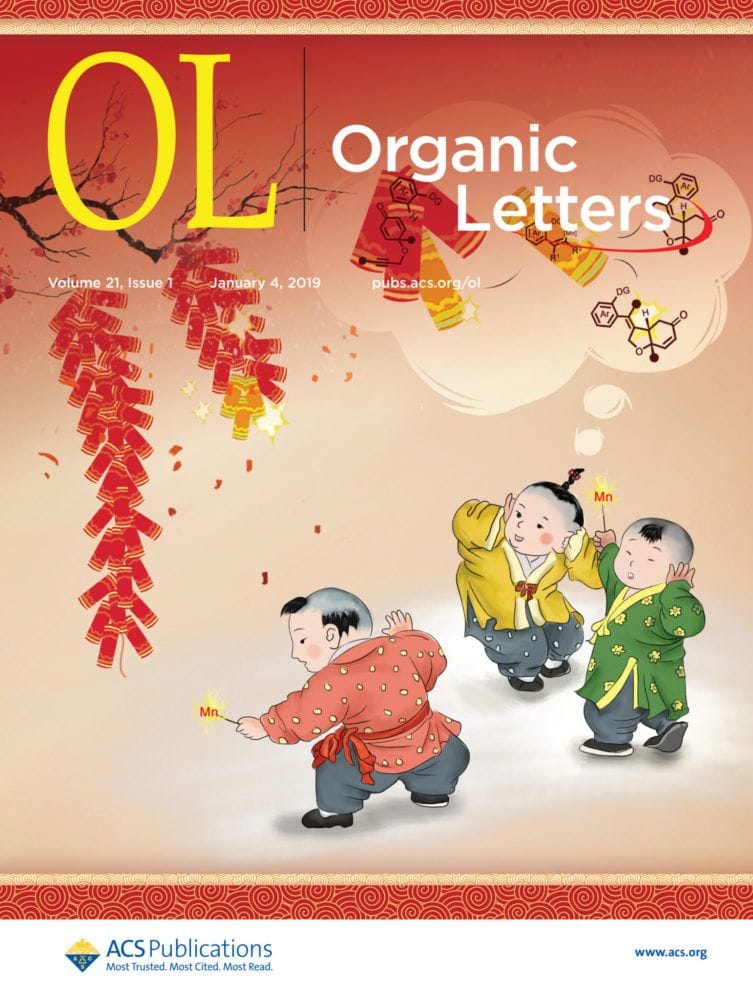Xile Hu, Professor at the Institute of Chemical Sciences and Engineering at the École Polytechnique Fédérale de Lausanne (EPFL) in Switzerland, is the winner of the 2017 Organic Letters Outstanding Publication of the Year Lectureship.

Xile Hu, Professor at the Institute of Chemical Sciences and Engineering at the École Polytechnique Fédérale de Lausanne (EPFL) in Switzerland, is the winner of the 2017 Organic Letters Outstanding Publication of the Year Lectureship. Organic Letters and the ACS Division of Organic Chemistry sponsor this annual award, which honors the author of an outstanding letter published in the previous calendar year that demonstrates creativity and impact in the field of organic chemistry.
Xile was chosen for this honor because of work on the hydrosilylation of alkenes employing a nickel pincer complex explained in the Organic Letter “Alkoxy Hydrosilanes as Surrogates of Gaseous Silanes for Hydrosilylation of Alkenes.”
“Professor Hu’s Organic Letters article describes a highly innovative catalytic method to employ readily available and safe alkoxy hydrosilanes as surrogates for pyrophoric and toxic silanes in the hydrosilylation of alkenes,” said the Lectureship selection committee. “Using a catalytic amount of a nickel pincer complex, sodium tert-butoxide, and various alkoxy hydrosilanes, Hu’s group achieved hydrosilylation with high chemoselectivity and with good functional group tolerance. The practical application of alkoxy hydrosilanes in the hydrosilylation of alkenes has important implications in fine chemical synthesis.”
Read all of Xile Hu’s articles from ACS Publications.
As winner of Organic Letters Outstanding Publication of the Year Lectureship for 2017, Xile will receive a $3,000 honorarium and travel and hotel accommodations to attend and a present at an ACS Division of Organic Chemistry session in his honor at the 2017 ACS Fall National Meeting in Washington, D.C. The session will also celebrate Melodie Christensen, winner of The Journal of Organic Chemistry Outstanding Publication of the Year Lectureship for 2017. Organic Letters, The Journal of Organic Chemistry, and the ACS Division of Organic Chemistry encourage you to attend the session on Sunday, August 20, 1 p.m. to 5 p.m.
An Interview with Xile Hu
I recently caught up with Xile to learn more about his research and what excites him about organic chemistry. Here are the highlights of our conversation.
What do you love about organic chemistry; why did you choose to pursue this field of research?
When we say “chemistry is a creative science,” we are mostly referring to organic chemistry. The logic of organic synthesis and the ability to create previously inexistent functional molecules fascinate me. I was initially trained as an inorganic chemist, but during my independent career, I realized that I could bring some new perspectives to the development of organic methodologies. Meanwhile, it is a great learning experience.
What made you interested in studying the hydrosilylation of alkenes employing a nickel pincer complex?
We had previously used nickel pincer complexes for cross coupling reactions of alkyl halides and we thoroughly studied the reactivity of these nickel pincer complexes. We found that certain nickel hydride complexes reacted preferentially with alkenes over ketones, which set the basis for chemoselective alkene hydrosilylation, because we could generate the hydride complexes by reactions with silanes. In a sense, the hydrosilylation work is truly by design. Another motivation of our work is of course the challenge and importance of this reaction.
What are the next steps in your research?
Specific to the nickel-catalyzed hydrosilylation, the mechanism turns out to be more complicated than we thought, so we hope to figure it out, especially with the aid of DFT computations. In general, our lab is working broadly in several catalysis-related projects. One such project concerns radical alkylation chemistry. We and others have found that alkyl radicals, even those without a stabilizing group, could be generated and used as a selective alkylating reagent under base metal catalysis, via cross coupling and addition type reactions. The control of stereoselectivity is a huge challenge, but it is something we would like to tackle next.
Is there anything else you’d like to share?
I would like to thank my co-workers for doing the real work – I am only the messenger – especially Ivan Buslov, who was the main contributor for our hydrosilylation chemistry.
